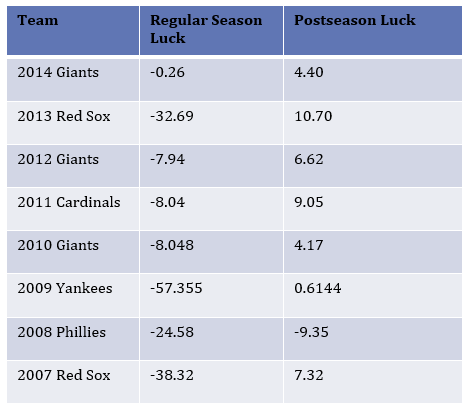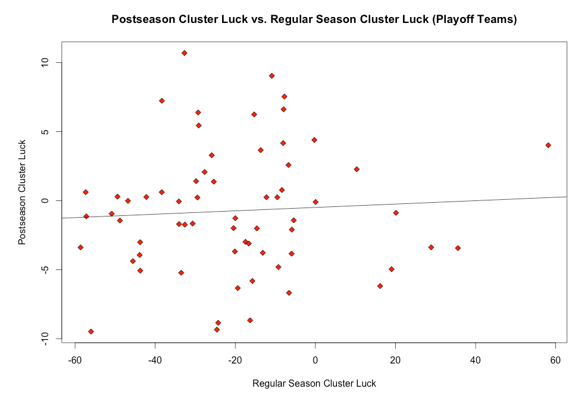Photo from wikimedia.org
Post by Vihan Lakshman
What role does luck play in baseball success? As one of the pioneering sports in quantitative analysis, our national past time is now understood—in many respects—as a finely tuned game of numbers. But does that tell the whole story?
Many prominent baseball figures, including Billy Beane, have described the MLB playoffs as a “crapshoot,” a roll of the dice that throws regular season success out the window. As Beane puts it, the teams who make the playoffs undoubtedly deserve to be there following a marathon 162 game regular season, but pure luck might be ultimate factor behind who finally ends up hoisting the World Series trophy.
To explore this idea of postseason luck in more detail, we can examine the “cluster luck” of teams in the regular season and the postseason. First coined by Joe Peta in his book Trading Bases, cluster luck provides a numerical measure of a team’s fortune in stringing together hits.
Jonah Keri of Grantland explains the phenomenon of cluster luck with an example: “Say a team tallies nine singles in one game. If all of those singles occur in the same inning, the team would likely score seven runs; if each single occurs in a different inning, however, it’d likely mean a shutout.”
As a further example of very unfortunate cluster luck, consider this box-score from Baseball-Reference from a 2005 meeting between Minnesota and Kansas City where the Twins tied a 1969 MLB record for the most hits in a game without a run.
Thus, if we use cluster luck as a tool to measure the respective fortunes of MLB teams in the regular season and the postseason, we might be able to shed some light on whether the playoffs are indeed a crapshoot, or if there is, in fact, a correlation between regular season and post season cluster luck—suggesting that cluster luck may not be luck at all.
While the idea behind cluster luck may make intuitive sense, there is no clear-cut, standard method of calculating how well a team bunches hits together. In this analysis, I used the base-runs formula, a model of predicting scoring, and considered the most accurate sabermetric statistic for run estimation. For all playoff teams between the years 2007 and 2014, I calculated each club’s regular season and postseason luck by determining their predicted run totals from the base runs formula and subtracting that from the actual amount of runs scored. A negative number indicates that a team scored fewer runs than expected and is hence “unlucky” while a positive score denotes “good luck” and specifies how many runs a team exceeded our base-runs prediction.
In examining the World Series winner from 2007-2014, we see that the vast majority of teams enjoyed positive cluster luck in the postseason.
Perhaps what’s more surprising about this list is the overwhelming amount of negative cluster luck during the regular season, most notably on the part of the 2009 Yankees who finished at the bottom of MLB in regular season luck. This phenomenon can likely be explained by considering that teams who manage to win games in spite of bad luck might be the most talented. In addition, this table of World Series winners provides our first bit of evidence that there may not be a correlation between regular season and postseason cluster luck, affirming the theory of the playoffs as a crapshoot.
To test this idea in further detail, I conducted a simple linear regression examining postseason cluster luck versus regular season luck.
Under the null hypothesis that the true slope of our linear regression is 0, we use a two-sided t-test to obtain a p-value of 0.6201, which is greater than our significance level of 0.1. Therefore, we cannot reject our null hypothesis and cannot conclude anything further about the relationship between postseason and regular season luck.
In our regression, we obtained an R2 value of 0.003987, suggesting that regular season cluster luck explains virtually none of the variance in postseason luck.
Ultimately, we found no evidence of a relationship between a team’s luck in the regular season and in the playoffs, which is what one would expect if it were truly luck. Although we cannot conclude that no relationship exists, there might in fact be something to the intuitive notion that the playoffs are a crapshoot. Whether this news is comforting to perennial playoff disappointments like the A’s, I can’t say, but the idea that luck can play such a huge role in determining legacies in sports is a fascinating question and definitely deserving of further exploration.
Vihan Lakshman is a junior from Savannah, GA studying mathematics. He also writes about football for The Stanford Daily and broadcasts sports for KZSU student radio. In his free time, he loves playing intramural sports and hopelessly rooting for the Atlanta Falcons to return to the Super Bowl.
Contact Vihan at vihan ‘at’ stanford.edu





Excellent post. I was checking constantly this blog and I am impressed!
Very useful info specifically the ultimate phase 🙂 I maintain such
info a lot. I was seeking this particular info for a very lengthy time.
Thanks and best of luck.
LikeLike